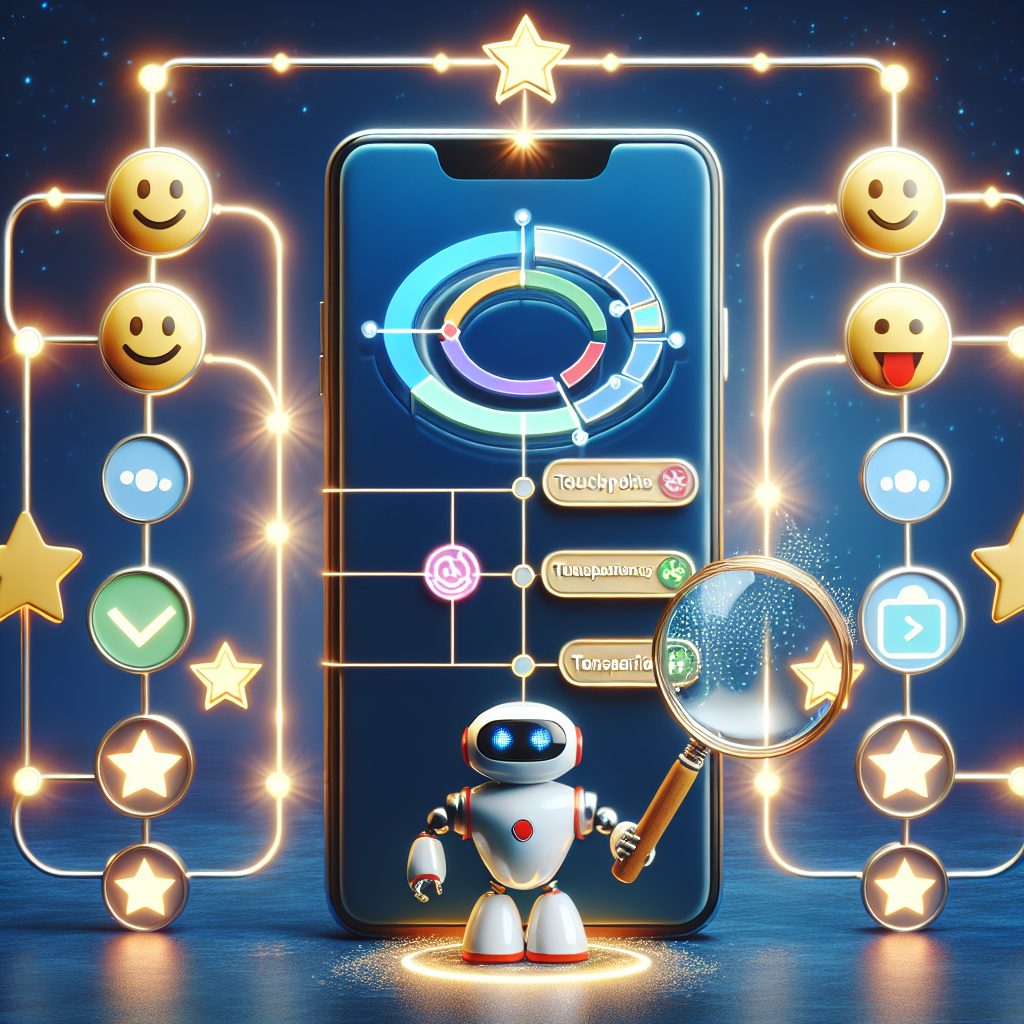
The integration of Artificial Intelligence (AI) in phone-based customer service is revolutionising the way businesses understand and enhance their customer journeys. AI can map customer interactions in ways previously not possible, providing comprehensive insights to help improve customer satisfaction and business efficiency.

The heart of this revolution involves ```json Customer Journey Mapping``` (CJM) powered by AI. CJM is a visual representation of every interaction a customer has with a business, from initial contact to resolution. The in-depth understanding of customer interactions yielded by CJM has been significantly improved by AI integration. By automating data collection and analysis, AI makes it easier to identify any pain points and successes in a customer interaction, helping to create a more seamless, tailored customer journey.
AI-driven phone-based customer services essentially take the human error element out of analysis, delivering highly accurate data that can be used to guide business decisions. With AI’s ability to process large amounts of data, a more complete picture of customer behaviour and preferences is created, improving both customer satisfaction and business efficiency.
Moreover, AI-driven solutions do not just analyse, but also learn and improve. An AI algorithm uses machine learning to continually refine the customer journey map based on data inputs, identifying patterns and trends that human analysts may miss. This way, businesses can ensure their customer service evolves in line with customer expectations, staying ahead of the game in an ever-competitive market.
A continued investment in technology, particularly AI, is the key to creating a customer-centric approach that enhances not only customer experience but also business operations.
The advancement of AI and machine learning technologies is revolutionizing client servicing and interaction strategies. A prevalent trend is the implementation of AI in phone-based customer journey mapping. This innovative method provides businesses with a comprehensive insight into their customers' experiences, from the initial contact point to the final purchase or interaction.
With AI tools, customer journey mapping can achieve a new level of sophistication. These tools can dissect and analyze every step of the customer journey, identifying and interpreting various context-specific behaviors. An example is predictive analytics, which enables businesses to make proactive decisions by anticipating the likely future actions of their customers.
Besides, AI can be used to provide tailored interactions at each stage of the journey. By understanding individual user patterns and preferences, AI can suggest personalized product recommendations, services, or content that can boost customer satisfaction and increase retention. Furthermore, AI-powered chatbots can interact with customers 24/7, alleviating potential wait times and improving the overall customer experience.
Moreover, with the implementation of voice recognition, businesses can enrich their customer journey mapping by analyzing the physical tone, pitch, and pace of their customers' speech. This aids in gauging emotional sentiments, which can play a vital role in pattern detection and target marketing.
At the heart of this dramatic shift is the recognition by businesses that in today's digital age, the customer journey is no longer a simple, linear path, but a complex web of interactions across multiple touchpoints. By implementing AI in phone-based customer journey mapping, businesses can achieve an unprecedented level of customer understanding, leading to improved engagement strategies, increased customer loyalty, and overall business growth.
In the current technological era, businesses are continually seeking ways to provide better customer experiences. One solution is to leverage the power of artificial intelligence (AI) in phone-based customer journey mapping. Many call centers are now utilizing AI-enabled phone systems to improve efficiency and resolve customer concerns more promptly.

One of the most significant features of these systems is AI-driven call routing. This technology streamlines the process of distributing incoming calls to the appropriate department or individual based on the caller's needs and the context of their conversation - a feature aptly known as Smart Call Routing. This ensures that customers are attended to by the most qualified service representative, reducing transfer rates and improving overall customer satisfaction.
Another crucial aspect is the capability to generate automated responses. With AI, phone systems can discern the purpose of a call and provide instant, applicable responses to common queries. This advances the concept of Interactive Voice Response (IVR) systems to a new level by offering personalized solutions in real-time, saving both the customer's and service representative's time.
Besides, the real-time data analytics provided by AI technology significantly adds value to the organization. The system can track and evaluate each interaction by factors like call duration, customer sentiment, resolution rate, and so on. Such insights can be valuable in improving customer experiences and augmenting business's strategic decisions.
To conclude, AI has remarkably restructured the commission of phone-based customer service. By implementing AI-driven call routing, automated responses, and real-time data analytics, enterprises can provide superior customer experiences, thus fostering brand loyalty and inspiring long-term growth.
In the past few years, numerous industries have harnessed the power of AI to unlock new insights into their customers' phone-based interactions – creating detailed customer journey maps that enhance customer service, improve operations, and promote business growth. Here, we discuss success stories in key sectors like retail, healthcare, and financial services that have reaped the benefits of deploying AI in their phone systems.
Retail: Starbucks, a globally recognized coffee company, has made significant strides in personalizing customer interactions through its AI-driven digital assistant, Barista. Barista employs deep learning technology to understand and learn from customer preferences, past orders, and interactions via phone and other digital platforms. This has resulted in greater customer engagement, sparking an increase in sales.
Healthcare: A leading pharmaceutical company, Pfizer, has embraced AI to improve healthcare delivery for patients. By incorporating AI in their call centers, Pfizer has streamlined patient interactions, reducing hold times and ensuring accurate responses to patient queries - resulting in superior customer service.
Financial services: Chase Bank has successfully implemented AI into their phone-based services, creating an advanced voice-based virtual assistant. This AI assistant can predict and respond to various customer requests, allowing the bank to offer a more personalized banking experience. Additionally, through detailed journey mapping, the assistant has facilitated major improvements in customer service and efficiencies in operations.
These stories reveal how AI can transform phone-based customer engagements, unlocking in-depth insights into customer behavior and preferences. As more industries embrace AI, phone systems will no longer just be about communication – they will be key tools for understanding customers and driving business growth.
As A.I technology continues to evolve, much anticipation surrounds future possibilities in enhancing phone-based customer service. A.I is predicted to shape the future trends in telephony, ushering in a new era of customer journey mapping, thanks to its capabilities in automating various customer service roles and harnessing data analytics.

One key trend to note is A.I-based voice assistants. With advanced Natural Language Processing (NLP) capabilities, these intelligent bots are predicted to become more sophisticated, offering personalized service to customers. They will be able to handle complex customer queries promptly, reducing waiting times and improving customer satisfaction.
Automation through AI will revolutionize how brands interact with their customers. A.I will be instrumental in simplifying booking systems, order placements and effecting service changes swiftly. Future A.I advancements are also expected to facilitate real-time tracking of customer service interactions, enabling brands to deliver more proactive customer service.
Moreover, A.I's predictive analytics capabilities will prove vital in customer journey mapping. By analyzing customer behavior patterns and trends, these intelligent tools will predict future customer needs and preferences, aiding businesses to formulate effective personalization strategies. As a result, brands will offer customized experiences, boosting customer loyalty and brand reputation.
In conclusion, the synergy between AI and telephony promises a future where seamless, personalized, and proactive customer service will be the norm rather than the exception. As much as these technological advancements present exciting prospects for businesses, they also call for brand owners to keep abreast with emerging A.I trends to leverage these potential benefits for optimal customer experience.
In the rapidly transforming landscape of customer service and support, it is impossible to ignore the immense contribution of Artificial Intelligence in reshaping phone-based customer experience. AI has brought about several revolutionary changes, such as interactive voice response systems (IVR), virtual assistants, and advanced analytics. These innovations not only streamline the process but also provide crucial insights for effective customer journey mapping.
Interactive voice response systems have evolved considerably, becoming more intelligent and context-aware, thanks to AI. Offering more nuanced responses to customer inquiries, IVRs have significantly reduced waiting times, delivering higher resolutions with fewer interactions. Learn more about AI in IVR systems.
AI-powered virtual assistants are another innovation that has proved indispensable for modern customer service. Equipped with Natural Language Processing (NLP) abilities, these assistants simulate human-like conversations, capturing the customer’s intent and offering personalized assistance.
The most significant change, however, is arguably in the realm of customer analytics. With the ability to collect and analyze vast amounts of data, AI facilitates in-depth customer journey mapping. This enables businesses to understand customer behavior better, anticipate their needs, and deliver a more personalized and satisfying customer experience. Learn more about AI's role in customer journey mapping.
In conclusion, AI has proved to be a game-changer for phone-based customer service. While we continue to harness its potential, it is clear that AI will play an even greater role in shaping the customer experience in the future. Businesses need to adapt and evolve with these changes to stay competitive and meet the ever-growing demands of their customers. Discover more about the future of AI in customer service.
Start your free trial for My AI Front Desk today, it takes minutes to setup!








